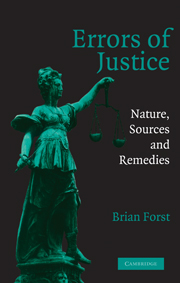Book contents
- Frontmatter
- Contents
- Preface
- Acknowledgments
- 1 The Problem
- 2 Errors of Due Process
- 3 Errors of Impunity
- 4 Frameworks for Analyzing the Incidence of Justice Errors
- 5 Assessing the Cost of Justice Errors
- 6 Standards of Evidence
- 7 Police-Induced Errors
- 8 Prosecution Policy and Justice Errors
- 9 The Jury
- 10 Sentencing and Corrections
- 11 Homicide
- 12 A Matter of Legitimacy
- Bibliography
- Index
- Titles in the series
11 - Homicide
Published online by Cambridge University Press: 05 July 2011
- Frontmatter
- Contents
- Preface
- Acknowledgments
- 1 The Problem
- 2 Errors of Due Process
- 3 Errors of Impunity
- 4 Frameworks for Analyzing the Incidence of Justice Errors
- 5 Assessing the Cost of Justice Errors
- 6 Standards of Evidence
- 7 Police-Induced Errors
- 8 Prosecution Policy and Justice Errors
- 9 The Jury
- 10 Sentencing and Corrections
- 11 Homicide
- 12 A Matter of Legitimacy
- Bibliography
- Index
- Titles in the series
Summary
Our capital system is haunted by the demon of error: error in determining guilt, and error in determining who among the guilty deserves to die. Because of all of these reasons today I am commuting the sentences of all death row inmates.
— Illinois Governor George H. Ryan (2003)Criminologists should not … belittle the lived experiences of the Klaas family and others that, like my own, have suffered the murder of a loved one at the hands of a released repeat criminal.
— John DiIulio (1994)Introduction
The case for managing errors of justice is most strikingly made for the crime of homicide. This is the most serious of all offenses, and we have better data on homicides than on any other major category of crime. Errors that involve the arrest and conviction of a wrong person are especially critical in cases in which defendants found guilty are eligible for the death penalty; an error of justice could conceivably result in the taking of the life of an innocent person. It was noted in Chapter 1 that over 100 death row inmates were found innocent and released from prison in the United States from 1976 to 2002. As the second of the two quotes that open this chapter makes clear, however, some people find it no less tragic when innocent people are brutally murdered by a prematurely released offender, a phenomenon that the documented evidence suggests has been more common at least over the past 50 years than has the execution of innocent defendants.
- Type
- Chapter
- Information
- Errors of JusticeNature, Sources and Remedies, pp. 184 - 211Publisher: Cambridge University PressPrint publication year: 2003



